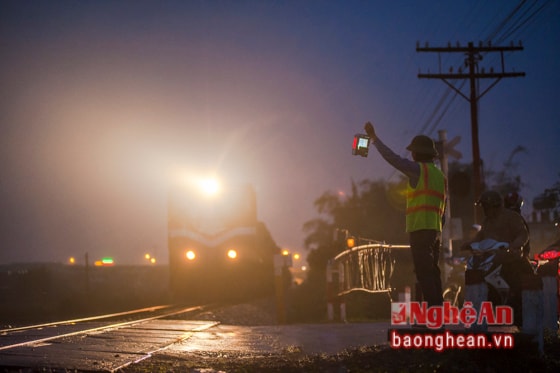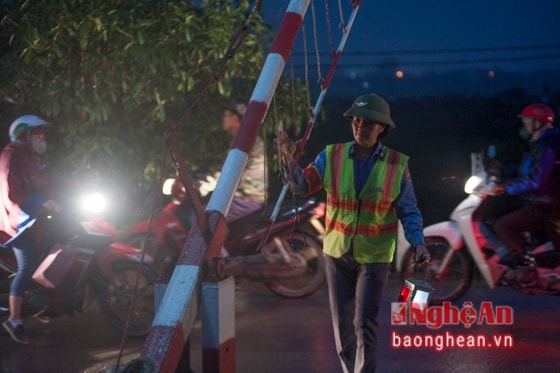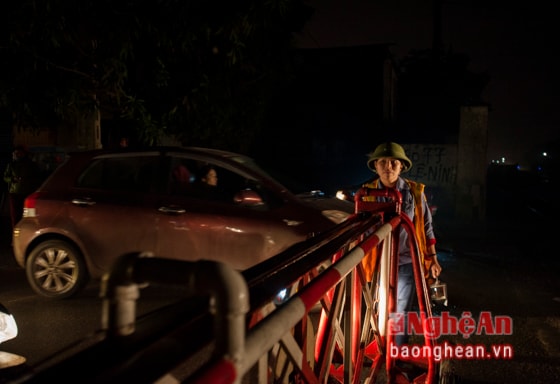Welcoming New Year's Eve on the railway crossing
(Baonghean.vn) - In the last days of the year, the North-South trains diligently and safely bring children far from home home for Tet. And behind those trains are the silent contributions of the people who are guarding the level crossings day and night.
 |
| Ms. Pham Thi Hoai Thanh during her night shift. |
When there is a signal that a train is about to pass through a level crossing, workers will quickly close the barrier to prevent people and vehicles from passing. The job seems simple but is full of difficulties, pressure and danger.
Ms. Pham Thi Hoai Thanh, born in 1974, a barrier worker at barrier 316+800, with nearly 20 years of experience in the profession, shared that her work is divided into shifts of 12 hours of continuous work followed by 12 hours of rest. Depending on the density of traffic participants at each barrier, the agency arranges the number of workers.
For example, at the north gate of Vinh station on Tran Binh Trong street, there are many people passing by, so there are 2 guards, while at gate 316+800 there is only 1 person. Every day, Ms. Thanh's main job is to answer the phone to report a train, record the train's arrival time and close the gate for the train to pass. Not to mention the maintenance and cleaning of the rails on both sides of the gate and the barrier as well as guiding and helping vehicles when passing through the level crossing.
 |
| The job of a gatekeeper is quite simple but it is not easy. |
The job of a railway crossing guard sounds simple but in reality it is not easy at all. Among the traffic participants, there are many people who, when the barrier is closed, still deliberately open the barrier to cross the railway tracks despite the danger.
Ms. Thanh and her colleagues were repeatedly insulted, threatened, and even had accidents caused by inconsiderate traffic participants when passing through barriers.
 |
| Ms. Nguyen Mai Huong, a barrier worker at Vinh station north station. |
Ms. Nguyen Mai Huong, born in 1985, a gatekeeper at Vinh station's north station, said that the time before or after Tet is the busiest time for the gatekeeper job when the number of trains going north and south increases significantly.
If on normal days, each shift of the gatekeeper only receives about 20 trains, this number can increase to 30 trains on days before or after Tet with additional trains. In particular, during the shift, the gatekeepers must stay awake, cannot sleep day or night, and cannot watch TV or use computers...
Whether it is before or after Tet, the gatekeepers still have to work during Tet. When it is their turn to be on duty, whether it is the 30th night or the 1st day of Tet, the gatekeepers still have to put aside their personal work to ensure the safety of the railway during these days. Ms. Thanh confided that although she has worked for many years, every time New Year's Eve comes, when many families gather together to warmly welcome the new year, she, alone at the gate, cannot help but feel homesick for her family.
After those moments of weakness at that time of transition, Ms. Thanh, Ms. Huong and many other workers at the crossing continued to silently do their job of protecting the safety of trains going north and south.
She said that for many years, she and her colleagues celebrated Tet on the railway crossing. At the moment of New Year's Eve, when the train met the crossing guard, the train driver often turned on the brightest lights and blew a long whistle to greet his colleagues and wish each other a happy new year. The sound of the train whistle and the beam of light at the moment of New Year's Eve has long become a joy, an emotional habit and also a source of pride for each crossing guard and patroller after each Tet shift...
Chu Thanh - Thanh Cuong








